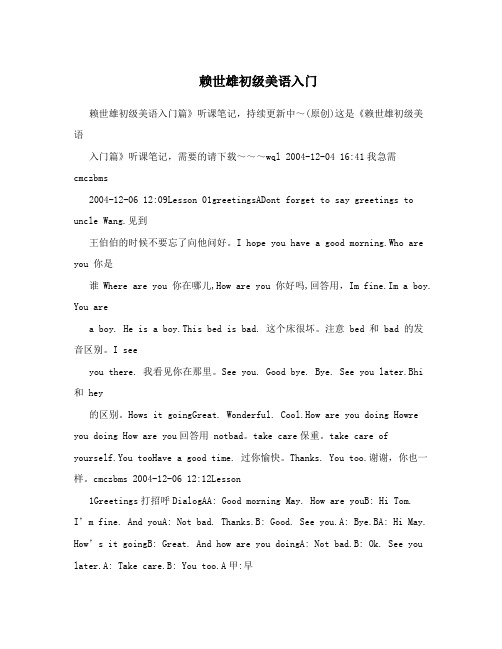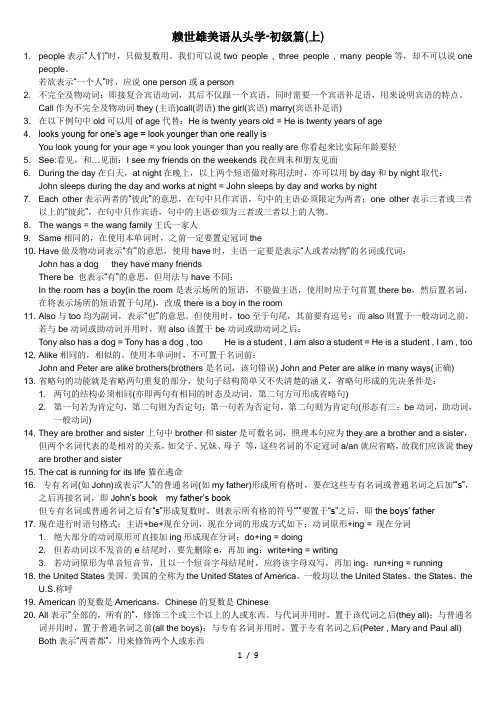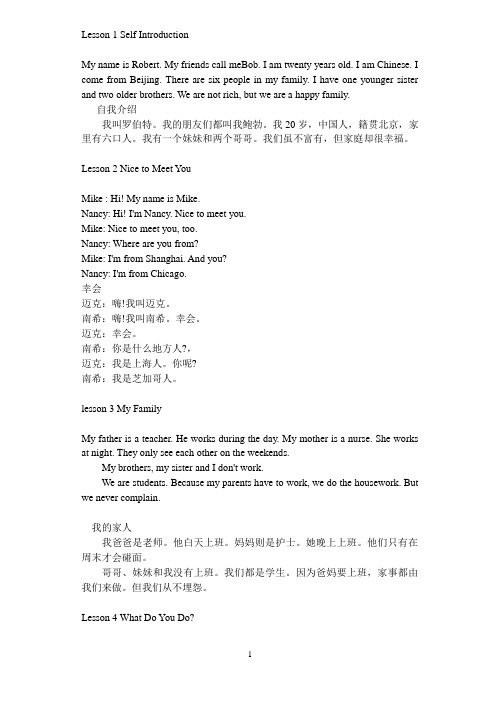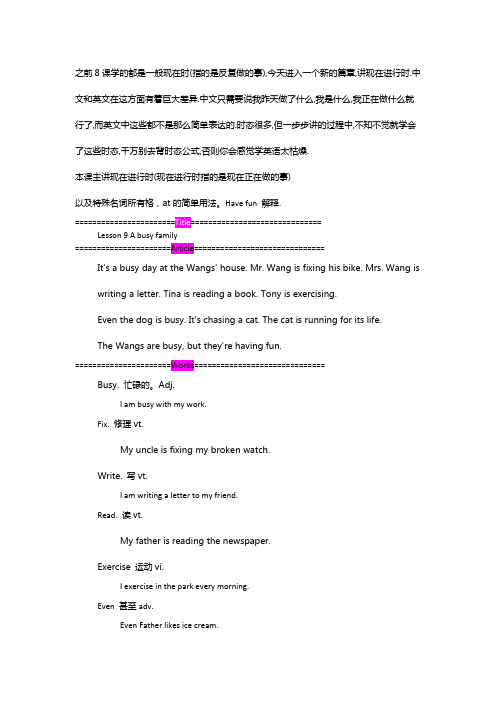赖世雄初级美语入门篇
赖世雄零起点英语1(入门篇)

读书笔记模板
01 思维导图
03 读书笔记 05 目录分析
目录
02 内容摘要 04 精彩摘录 06 作者介绍
思维导图
关键字分析思维导图
老师
爱好
入门篇
知识
零起点
时间
宾语
零起点
语法
英语 副词
疑问
赖世雄
活用
信
进行时
名词
动词
笔友
内容摘要
很多人想学好英语,却总是事与愿违,其实不是我们学不好,而是英语基础不够扎实。
贴身家教,不出国也能把英语学得棒棒的!
《赖世雄零起点英语》系列由赖世雄老师和吴纪维老师精心编写,
常青藤英语团队细心编辑加工,一共三册,以美语为主,共230课,依次分为入门篇、基础篇、进阶篇。零起点1
是零散的基础语法知识点的介绍,2和3慢慢介入课文的形式,通过文章语境的实例运用进一步巩固前附的语法知
识。是一套由浅入深、循序渐进、图文并茂、内容实用的英语教程,配合讲解音频,句句干货,让学习扎实又有
every day是时间副词,表示“每一天”,是两个词,可以置于句尾或句首;everyday是形容词,表示“每 天的”,是一个词,之后一定要加名词。
字尾如果是t或d时,若与后面的词没有连读,则该t或d要消音。如Paul and David中and的d要消音。
here表示“这里”;there表示“那里”。两者之前都可以接over,用来强调语气,表示“就在”。
Lesson 25 活用 特殊疑问句及一般
问句
Lesson 27 时刻 的说法1
Lesson 28 时刻的 说法2
Lesson 29 活用时 间名词
Lesson 30 介绍现 在进行时
赖世雄初级美语入门

赖世雄初级美语入门赖世雄初级美语入门篇》听课笔记,持续更新中~(原创)这是《赖世雄初级美语入门篇》听课笔记,需要的请下载~~~wql 2004-12-04 16:41我急需cmczbms2004-12-06 12:09Lesson 01greetingsADont forget to say greetings to uncle Wang.见到王伯伯的时候不要忘了向他问好。
I hope you have a good morning.Who are you 你是谁Where are you 你在哪儿,How are you 你好吗,回答用,Im fine.Im a boy. You area boy. He is a boy.This bed is bad. 这个床很坏。
注意 bed 和 bad 的发音区别。
I seeyou there. 我看见你在那里。
See you. Good bye. Bye. See you later.Bhi 和 hey的区别。
Hows it goingGreat. Wonderful. Cool.How are you doing Howre you doing How are you回答用 notbad。
take care保重。
take care of yourself.You tooHave a good time. 过你愉快。
Thanks. You too.谢谢,你也一样。
cmczbms 2004-12-06 12:12Lesson1Greetings打招呼DialogAA: Good morning May. How are youB: Hi Tom.I’m fine. And youA: Not bad. Thanks.B: Good. Se e you.A: Bye.BA: Hi May. How’s it goingB: Great. And how are you doingA: Not bad.B: Ok. See you later.A: Take care.B: You too.A甲:早啊,小梅。
赖世雄美语从头学初级篇上

赖世雄美语从头学-初级篇(上)1. people表示“人们”时,只做复数用。
我们可以说two people , three people , many people等,却不可以说onepeople。
若欲表示“一个人”时,应说one person或a person2. 不完全及物动词:即接复合宾语动词,其后不仅跟一个宾语,同时需要一个宾语补足语,用来说明宾语的特点。
Call作为不完全及物动词they (主语)call(谓语) the girl(宾语) marry(宾语补足语)3. 在以下例句中old可以用of age代替:He is twenty years old = He is twenty years of age4. looks young for one’s age = look younger than one really isYou look young for your age = you look younger than you really are你看起来比实际年龄要轻5. See:看见,和…见面:I see my friends on the weekends我在周末和朋友见面6. During the day在白天,at night在晚上,以上两个短语做对称用法时,亦可以用by day和by night取代:John sleeps during the day and works at night = John sleeps by day and works by night7. Each other表示两者的“彼此”的意思,在句中只作宾语,句中的主语必须限定为两者;one other表示三者或三者以上的“彼此”,在句中只作宾语,句中的主语必须为三者或三者以上的人物。
8. The wangs = the wang family王氏一家人9. Same相同的,在使用本单词时,之前一定要置定冠词the10. Have做及物动词表示“有”的意思,使用have时,主语一定要是表示“人或者动物”的名词或代词:John has a dog they have many friendsThere be 也表示“有”的意思,但用法与have不同:In the room has a boy(in the room是表示场所的短语,不能做主语,使用时应于句首置there be,然后置名词,在将表示场所的短语置于句尾),改成there is a boy in the room11. Also与too均为副词,表示“也”的意思。
(完整word版)赖世雄美语从头学-初级篇(上)

赖世雄美语从头学-初级篇(上)1. people表示“人们”时,只做复数用。
我们可以说two people , three people , many people等,却不可以说one people。
若欲表示“一个人”时,应说one person或a person2. 不完全及物动词:即接复合宾语动词,其后不仅跟一个宾语,同时需要一个宾语补足语,用来说明宾语的特点。
Call作为不完全及物动词they (主语)call(谓语) the girl(宾语) marry(宾语补足语)3. 在以下例句中old可以用of age代替:He is twenty years old = He is twenty years of age4. looks young for one’s age = look younger than one really isYou look young for your age = you look younger than you really are你看起来比实际年龄要轻5. See:看见,和…见面:I see my friends on the weekends我在周末和朋友见面6. During the day在白天,at night在晚上,以上两个短语做对称用法时,亦可以用by day和by night取代:John sleeps during the day and works at night = John sleeps by day and works by night7. Each other表示两者的“彼此”的意思,在句中只作宾语,句中的主语必须限定为两者;one other表示三者或三者以上的“彼此”,在句中只作宾语,句中的主语必须为三者或三者以上的人物。
8. The wangs = the wang family王氏一家人9. Same相同的,在使用本单词时,之前一定要置定冠词the10. Have做及物动词表示“有”的意思,使用have时,主语一定要是表示“人或者动物”的名词或代词:John has a dog they have many friendsThere be 也表示“有”的意思,但用法与have不同:In the room has a boy(in the room是表示场所的短语,不能做主语,使用时应于句首置there be,然后置名词,在将表示场所的短语置于句尾),改成there is a boy in the room11. Also与too均为副词,表示“也”的意思。
赖世雄初级美语(全)

Lesson 1 Self IntroductionMy name is Robert. My friends call meBob. I am twenty years old. I am Chinese. I come from Beijing. There are six people in my family. I have one younger sister and two older brothers. We are not rich, but we are a happy family.自我介绍我叫罗伯特。
我的朋友们都叫我鲍勃。
我20岁,中国人,籍贯北京,家里有六口人。
我有一个妹妹和两个哥哥。
我们虽不富有,但家庭却很幸福。
Lesson 2 Nice to Meet YouMike : Hi! My name is Mike.Nancy: Hi! I'm Nancy. Nice to meet you.Mike: Nice to meet you, too.Nancy: Where are you from?Mike: I'm from Shanghai. And you?Nancy: I'm from Chicago.幸会迈克:嗨!我叫迈克。
南希:嗨!我叫南希。
幸会。
迈克:幸会。
南希:你是什么地方人?,迈克:我是上海人。
你呢?南希:我是芝加哥人。
lesson 3 My FamilyMy father is a teacher. He works during the day. My mother is a nurse. She works at night. They only see each other on the weekends.My brothers, my sister and I don't work.We are students. Because my parents have to work, we do the housework. But we never complain.我的家人我爸爸是老师。
赖世雄美语从头学初级篇Lesson 9学习笔记

之前8课学的都是一般现在时(指的是反复做的事),今天进入一个新的篇章,讲现在进行时.中文和英文在这方面有着巨大差异.中文只需要说我昨天做了什么,我是什么,我正在做什么就行了,而英文中这些都不是那么简单表达的.时态很多,但一步步讲的过程中,不知不觉就学会了这些时态,千万别去背时态公式,否则你会感觉学英语太枯燥.本课主讲现在进行时(现在进行时指的是现在正在做的事)以及特殊名词所有格,at的简单用法。
Have fun 解释.=====================================================Lesson 9 A busy family======================Article==============================It's a busy day at the Wangs' house. Mr. Wang is fixing his bike. Mrs. Wang is writing a letter. Tina is reading a book. Tony is exercising.Even the dog is busy. It's chasing a cat. The cat is running for its life.The Wangs are busy, but they're having fun.======================Words==============================Busy. 忙碌的。
Adj.I am busy with my work.Fix. 修理vt.My uncle is fixing my broken watch.Write. 写vt.I am writing a letter to my friend.Read. 读vt.My father is reading the newspaper.Exercise 运动vi.I exercise in the park every morning.Even 甚至adv.Even Father likes ice cream.Chase 追逐vt.The policeman is chasing the thief.之前讲过及物动词不及物动词,vt.就是及物,vi.就是不及物=====================Grammar==============================It's a busy day at the Wangs' house.现在进行时Having fun.=======================讲解==============================Lesson nine A busy family.9 英文是nine.Busy 忙碌的a.Are you busy? 你忙吗?No I’m not. I am free now.我不忙,我现在有空.Free a.自由的,在这里是有空的I’m not busy. I am free.It's a busy day at the Wangs' house.It's = it is. it是代词,可以代替一般事物.it在这代表此刻.What time is it by your watch? 你的表几点了?It is five by my watch.我的表5点了,也可以写It's five now.或干脆it's five.It is windy. 今天是多风的.It's windy (today).The Wangs 是王姓这一家人. 但是所有格形式都是加's但这里单词最后一个是s,所以直接加'就好了" the Wangs'"是王家的所有格后面跟house就是说,王家的房子. family是抽象的家的意思,house就是住的这个房子.Mr. Wang is fixing his bike.王先生正在修理他的自行车.Bike 就是bicycle的简称.fix就是动词修理,加ing变成fixing 叫现在分词.He can fix the bike. 他会修自行车.但是要说他正在修车怎么说呢?这就引出了现在进行时.句型就是: 主语+ be动词+ 动词现在分词…He is fixing the bike. 他正修这辆自行车.中文里面所说的,正在…在英文中就要用现在进行时.我正在学习,学习单词是study.但要怎么表示我正在学习?主语:我+be动词(am) +study的现在分词(studying)I am studying.所有正在进行时,都可以在句尾加个now(现在),也可不加I am studying now.这样也可以Mr. Wang is fixing his bike now.这样也可以Mrs. Wang is writing a letter.本来学的是Mrs. Wang writes a letter.但那是常态(一般现在时) 代表她天天这样,一直这样.He writes very well.这样可以,因为他写的现在一直都是好的.He speak English very well.他说的英语一直都好,有这个隐含的意思.(当然不是说从生下来,而是说他现在都好)因此知道了,写信不可能是天天时时常态的在写.她的名词是常态,她的身高是常态,她天天工作的时间是常态.这些都用一般现在时.而他现在正在写信不是常态,而是现在进行时.Tina is reading a book.这里也是一样,她正在看书.Tony is exercising.这里也同样的.exercise. 是锻炼的动词.如果他天天早上运动,Tony exercises every morning.这就可以用一般现在时(常态)暗示他天天早上这样Even the dog is busy.Even 甚至. Even he can do it.甚至他都可以做这个.What is the dog doing? 狗子正在做什么?再复习一下造句,不要打我.The dog is doing what? 这是中文的方式先把疑问词放前: what the dog is doing?句中有be动词,所以be动词与主语倒装:What is the dog doing? 造句成功.再来一个: 你正在做什么啊?You are doing what?What are you doing? (这次不讲过程了)I am studying.我正在学习.It's chasing a cat.chase追赶,之前学过( well, your dog chases my cat)动词结尾是不发音的e把e去掉再加ing形成现在分词.The cat is running for its life.The cat is running…这猫正在跑…这里running是动词run的现在分词,为什么加个n再加ing你一定要先看grammar部分再来看讲解.这里就不说了for在这里是(为了)的意思. its它的,life生命.猫在为了它的生命而跑,就是翻译:它在跳命.The Wangs are busy, but they're having fun.They're having fun.又是一个现在进行时.Have fun是短语,玩得愉快的意思I am having fun.我正玩得高兴.并不是所有动词都可以改现在进行时I have some money.我有一些钱.I am having some money.我正在有些钱.这中文都说不通,同样英文也不能用.正在进行时使用和中文是一样的,我正在吃早餐:I am having breakfast. 这就可以了======================Practice============================== Mr. Wang is fixing hisBike.Television.Car.如果把这个句子变成问句,王先生正在做什么?Mr. Wang is doing what?What Mr. Wang is doing?What is Mr. Wang doing? 成功同样下面what is Tina doing?Tina is readingA book.A magazine.A newspaper.Tony isExercisingJogging.Playing basketball.What are you doing?I am jogging.。
赖世雄初级美语入门篇 第一课,打招呼

第一课,打招呼Lesson One Greetings
见到王伯伯的时候,别忘了向他打个招呼哦,向他问好。
do not forget to see Greetings to Uncle Wang.
两人的对话1 Dialogue A
汤姆:小梅,早啊!T: Good morning Mei!
你好吗?How are you ?
小梅:嗨!汤姆,我还不错啊,那你呢?M: Hi Tom !I'm fine ,and you ?
汤姆:还不赖,谢谢了!T: Not bad thanks.
小梅:好。
再见!M:Good see you!
汤姆:再见!T:Bye !
第一人称:I am
第二人称: You are
第三人称:He is
两人的对话2 Dialogue B
汤姆:嗨,小梅!T: Hi Mei!
近来如何啊?How's it going?
小梅:太棒了!M: Great!
那你呢?好不好啊?And how are you doing ?
汤姆:还不赖。
T: Not bad.
小梅:好,呆会见M: OK see you later.
汤姆:保重T: Take care .
小梅:你也一样M: You too
Hi 是问候的礼貌用语。
Hey 是嘿的意思显得不礼貌。
Great 棒,太棒了。
也可以用cool 棒,棒极了。
how are you doing的缩写为how're you doing 这个缩写不知道是否正确。
《赖世雄初级美语》word版(全-经典)

Lesson 1 Self IntroductionMy name is Robert. My friends call me Bob. I am twenty years old. I am Chinese.I come from Beijing. There are six people in my family. I have one younger sister and two older brothers. We are not rich, but we are a happy family.自我介绍我叫罗伯特。
我的朋友们都叫我鲍勃。
我20岁,中国人,籍贯北京,家里有六口人。
我有一个妹妹和两个哥哥。
我们虽不富有,但家庭却很幸福。
Lesson 2 Nice to Meet YouMike : Hi! My name is Mike.Nancy: Hi! I'm Nancy. Nice to meet you. Mike: Nice to meet you, too.Nancy: Where are you from?Mike: I'm from Shanghai. And you? Nancy: I'm from Chicago. 幸会迈克:嗨!我叫迈克。
南希:嗨!我叫南希。
幸会。
迈克:幸会。
南希:你是什么地方人?,迈克:我是上海人。
你呢? 南希:我是芝加哥人。
Lesson 3 My FamilyMy father is a teacher. He works during the day. My mother is a nurse. She works at night. They only see each other on the week- ends. My brothers, my sister and I don't work. We are students. Because my parents have to work, we do the housework. But we never complain.我的家人我爸爸是老师。
- 1、下载文档前请自行甄别文档内容的完整性,平台不提供额外的编辑、内容补充、找答案等附加服务。
- 2、"仅部分预览"的文档,不可在线预览部分如存在完整性等问题,可反馈申请退款(可完整预览的文档不适用该条件!)。
- 3、如文档侵犯您的权益,请联系客服反馈,我们会尽快为您处理(人工客服工作时间:9:00-18:30)。
cmczbms2004-12-06 12:09 Lesson 01greetingsADon't forget to say greetings to uncle Wang.#见到王伯伯的时候不要忘了向他问好。
I hope you have a good morning.Who are you? #你是谁?Where are you? #你在哪儿?How are you? #你好吗?回答用,I'm fine.I'm a boy. You are a boy. He is a boy.This bed is bad. #这个床很坏。
注意bed和bad的发音区别。
I see you there. #我看见你在那里。
See you. = Good bye. = Bye. = See you later.Bhi和hey的区别。
How's it going?Great. = Wonderful. = Cool.How are you doing? =How're you doing? = How are you?#回答用not bad。
take care#保重。
take care of yourself.You tooHave a good time. #过你愉快。
Thanks. You too.#谢谢,你也一样。
DialogAA: Good morning, May. How are you? B: Hi, Tom. I’m fine. And you?A: Not bad. Thanks.B: Good. See you.A: Bye.BA: Hi, May. How’s it going?B: Great. And how are you doing? A: Not bad.B: Ok. See you later.A: Take care.B: You too.A甲:早啊,小梅。
你好吗?乙:嗨,汤姆。
我很好,你呢?甲:还不错,谢了。
乙:很好,再见。
甲:再见。
B甲:嗨,小梅。
近来如何?乙:很好。
那你呢?甲:还不错。
乙:好吧,再见。
甲:保重。
乙:你也是。
Substitution1Good morning, May.Good afternoon, May.Good evening, May.早安,小梅。
午安,小梅。
晚安,小梅。
2How are you?How are you doing?你好吗?3I’m fine.I’m OK.我很好/还好。
4And you?What about you?How about you?那你呢?5Not bad. Thanks.Great. Thanks.Fine. Thanks.还不错/很好/还好,谢了。
6Thanks.Thank you.Thank you very much.Thanks a lot.谢谢。
谢谢你。
非常谢谢你。
多谢。
7Good. See you.Good. See you later.Good. Bye.Good. Goodbye.很好,再见。
8How’s it going?What’s up?What’s happening?近来如何?cmczbms2004-12-09 09:48Lesson 210:00He has courtesy. He has no courtesy.Excuse me, but where is the station?Excuse me, but where is Peter?He is a boy. Is he a boy?I'm a boy. Am I a boy?Are you happy? No, I'm not. #你快乐吗?不,我不快乐。
excuse me是打扰人家的时候说的对不起,弄错了或抱歉告诉一个坏消息,要说I'm sorry. Excuse me, but what are you doing now?I'm sorry, but you are wrong. #很抱歉,你错了。
I'm sorry, but you didn't pass the test.#很抱歉你考试没有考及格。
Who are you? Who are they? Who is he?don't guest gas#“不客气”You're welcome. #不客气。
Courtesy costs nothing. #礼貌不花钱。
礼多人不怪。
lazy English#懒惰式的英语May I beg your pardon? ---> I beg your pardon? ---> Pardon?Nice to meet you.It is nice to meet you.[2004-10-02 2208]Rm04.mp3Not only because she is beautiful, but she is friendly. #她不仅是非常的漂亮,而且是非常的友善。
Courtesy costs nothing. #礼多人不怪。
May I ... ... ? #我可以... ...May I go?#我可以离开吗?May I leave?May I eat it?#我可以吃那个东西吗?May I beg your pardon? ---> I beg your pardon? ---〉Pardon? #我可以祈求你的宽恕吗?延伸的意思是,对不起我没听清楚,请再说一遍好吗?It's nice to meet you. ---> Nice to meet you.#能够见到你那是一件好事。
I'm pleased to meet you. ---> Pleased to meet you.I'm pleased to see you.P14vocabulary#/vE5kAbjulEri/#n.词汇, 词汇量, 词表。
这个词是个不可数名词。
word是个可数名词。
one word/ two words。
idiom是个可数名词。
one idiom/ one idioms。
#n.白痴, 愚人, 傻瓜/τEιδι5/idiot#pumpkin head#n.傻瓜#n.南瓜/νικπμΘπ5/pumpkin#在英语中音标s后面有k时,k要念成g的音。
比如excuse/skirt的发音。
#vt.原谅,/ζ:υϕκ5σκι/excuse# 申辩, 做为...的托辞, 为...免去n.饶恕, 致歉, 理由, 口实, 借口, 清借条, 免去#n.裙子v.环绕/τ:Eκσ/skirt#big/beg, bed/bad。
注意这两组词的发音。
Nice to see you.Nice to meet you.Nice to talk to you.to talk to someone#跟某人说话I like to talk with you.#我喜欢跟你谈话。
=I like to talk to you.P16I'm sorry, but you have to zip it up. #对不起,你必须把拉链拉起来。
I'm sorry, but your fly is open. #Your fly's undone.#你裤子的钮扣没扣好。
Where is the postoffice?#邮局在哪里?Where is the bank?#银行在哪里?You're welcome. Don't mention it. Not at all. No problem.#别客气,没问题。
You're welcome. 和Don't mention it. 是最正式的说法。
P17I beg your pardon? Beg your pardon? Pardon me? Pardon?Could you pardon me? Would you pardon me? ---> Pardon me? ---> Pardon? It's nice to meet you. ---> Nice to meet you.I'm pleased to meet you. ---> Pleased to meet you.I'm glad to meet you. ---> Glad to meet you.Rm05.mp3P19在说他是/我是/你是,的时候,后面一定是名词。
在后面是形容词的时候,就不能翻译成是,我很快乐,她很漂亮,I'm happy. She is beautifu.I'm very nice. Trust me. I would not deceive you. I would not do anything bad to you.#v.欺骗, 行骗 deceive#He is hungry now.在英文里面把现在/今天/明天... ...表示时间的副词放在句尾。
I will see you tomorrow. I saw him yesterday.You are cute. #你好可爱。
P20Thank you very much for your help.Nice to meet you, too. #强调的用法。
cmczbms2004-12-09 12:04《赖世雄初级美语入门篇》Lesson2课文和替换练习Lesson 2Courtesy礼貌DialogAA: Excuse me. Are you Ann?B: No, I’m not.A: I’m sorry. Who’s Ann?B: She is.A: Thank you.B: You’re welcome.BA: Hi, I’m Tom.B: I beg your pardon?A: I’m Tom.B: Oh! Hi, Tom. I’m May.A: Nice to meet you, May.B: Pleased to meet you.AA: 对不起,请问你是安吗?B: 不,我不是。
A: 很抱歉。
请问安是哪位?B: 她是。
A: 谢谢。
B: 不客气。
BA: 嗨,我是汤姆。
B: 对不起,请再说一遍好吗?A: 我是汤姆。
B: 哦,嗨,汤姆。
我是小梅。
A: 很高兴认识你,小梅。
B: 幸会,幸会。
Substitution1You’re welcome.Don’t mention it.Not at all.No problem.不客气。
